Column: I’ll never be a regular at Koreatown’s OB Bear, but I’m glad to be a guest
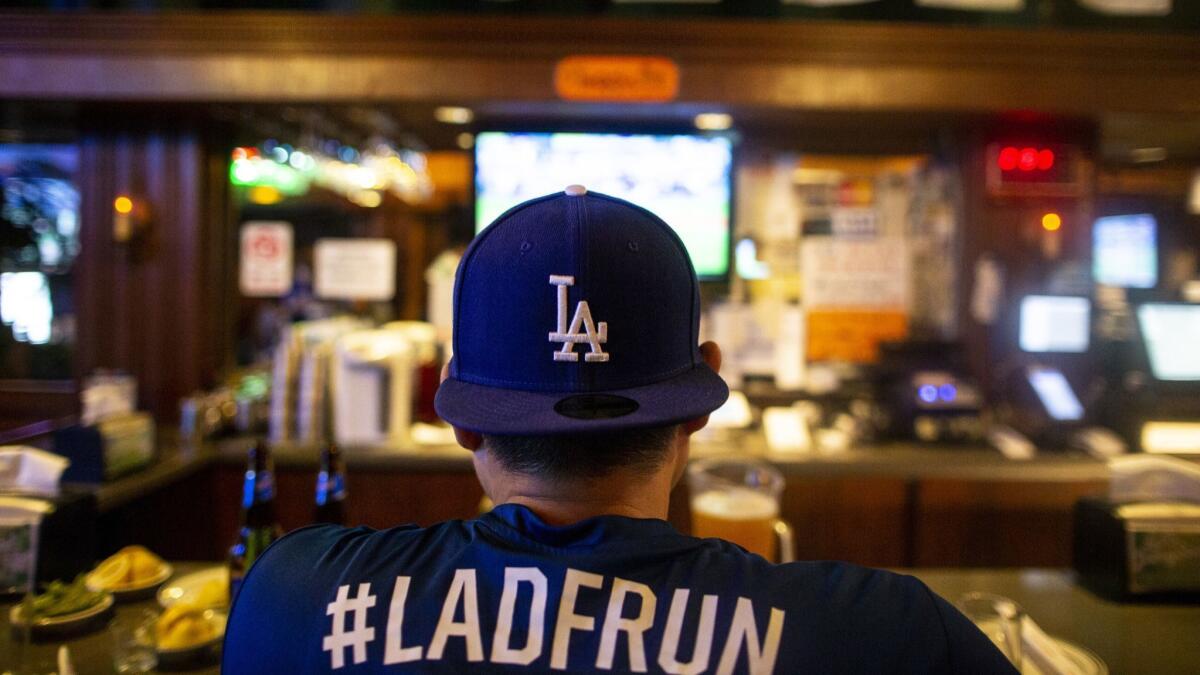
- Share via
At OB Bear in Koreatown, I’ve slapped exuberant high-fives with Korean aunties over Hyun-Jin Ryu bloop singles and lost my voice screaming over Justin Turner home runs.
But I’ll probably never be considered a regular at OB Bear. Some days, I even struggle to get a seat. On a given weekday when the Dodgers play, most of the tables will be taken by Korean patrons who are ushered right past the wait list. I’d never even seen the second floor of the restaurant, though I’d heard that it houses a reserved table for journalists with the Korea Daily.
I’m a stranger here, and I’ve learned to be OK with that. It’s a feeling we might as well get used to in a city that overflows with the cultures of the world.
Much like we’ve learned to act a certain way around celebrities in Los Angeles, I think there’s an unspoken code that applies when you’re in another culture’s space.
You don’t need to leave a bad Yelp review for Worldwide Tacos in Leimert Park just because your order takes too long. You recognize that the service at affordable Chinese restaurants in the San Gabriel Valley isn’t rude — the owners are just busy running the restaurant by themselves. It’s about recognizing that you’re a guest, acting like you’ve been there before and treating everyone with respect.
OB Bear taught me that. In the past, I would become frustrated by my inability to get a table, despite a clean record of generous tips and gracious behavior. Every time I came in, I tried for eye contact with the longtime manager. I waved but he didn’t always wave back. Occasionally we chatted. He was always polite, but he seemed more comfortable speaking Korean.
DODGER FANS: Where is your slice of blue heaven? »
But I keep coming back because it’s one of my favorite places — a seemingly anonymous space that actually has a very specific story if you care to learn it.
It was named for a Korean professional baseball team that used to be called the OB Bears, a nod to its sponsor, a South Korean beer company. When the team became the Doosan Bears in 2000, the bar kept the name, asserting, like many immigrants, a cultural identity frozen in time and history.
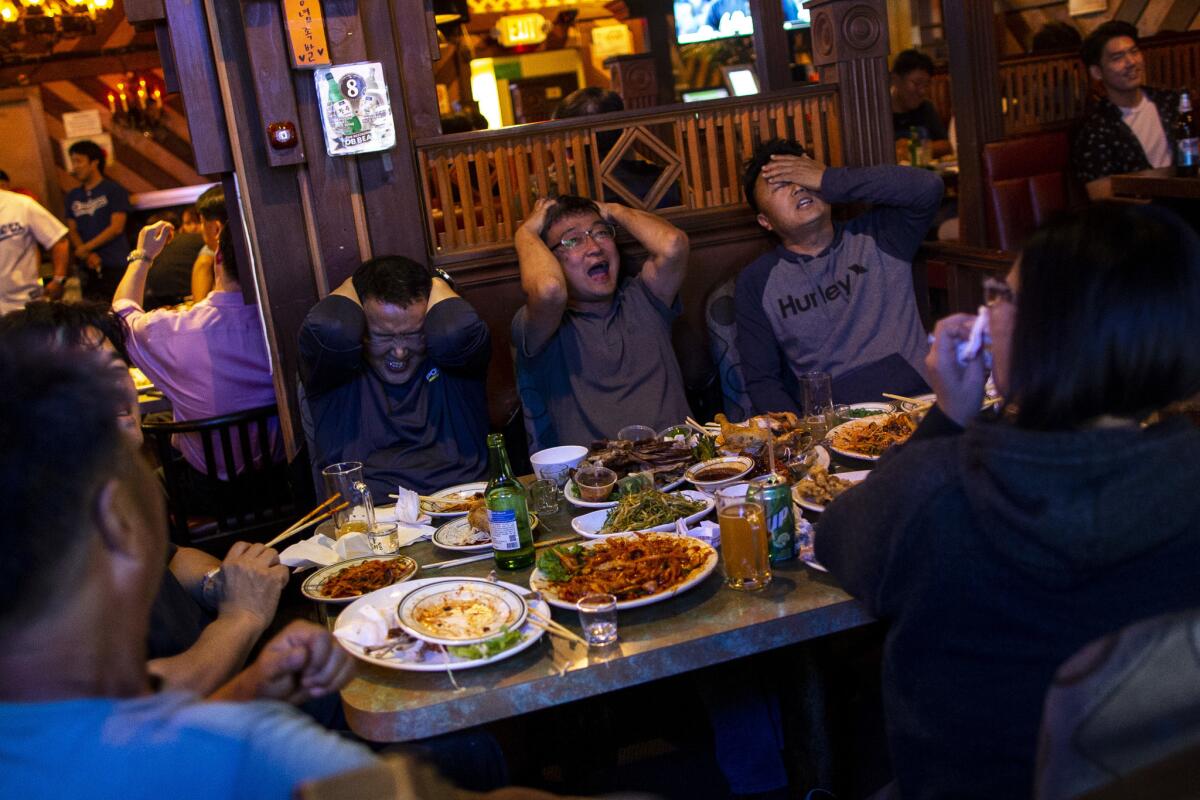
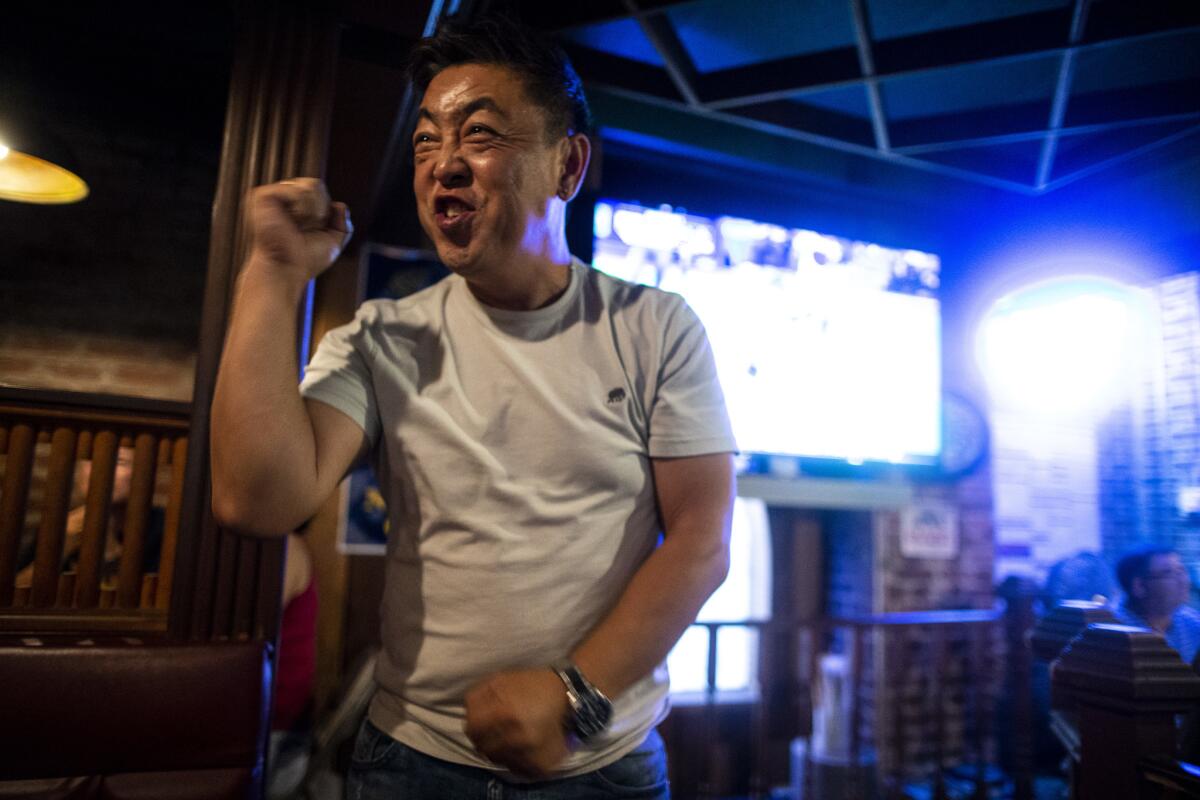
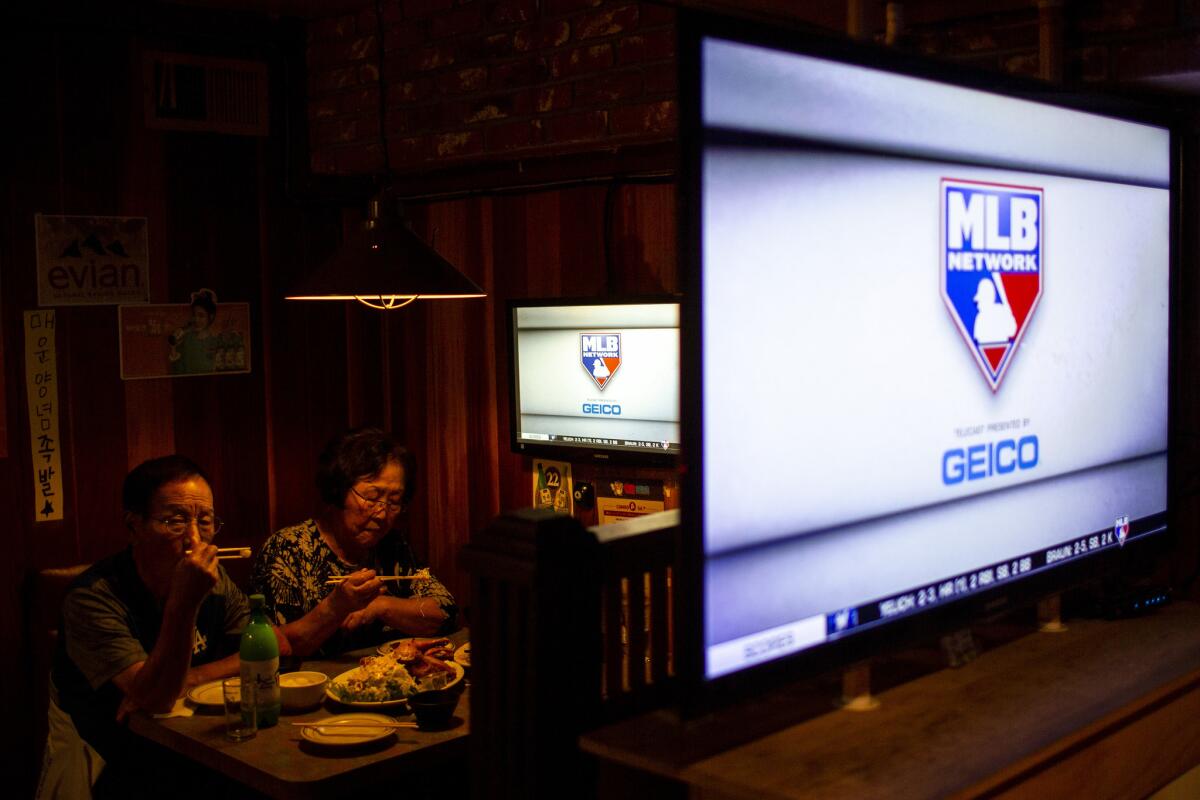
Inside you’ll find dark, scarred red leather booths and a carved wooden counter, harking back to an age when Hollywood stars roamed the area and many bars were Frank Sinatra haunts.
On the wall are autographs from a new era of celebrities: “Walking Dead” actor Steven Yeun, chef David Chang, and rapper Dumbfoundead. The wall used to feature an autograph from Lee Seung-yuop, one of the best Korean hitters of all time, but it was stolen by a drunk guest one night.
In the dining room, rustic chain chandeliers that seem plucked from a pirate ship cast thin yellow light over well-worn blue carpet and fading Soju advertisements. Hanging in the staircase, apropos of nothing, is a replica of Édouard Manet’s “A Bar at the Folies-Bergère” painted by a friend of the owner.
All of this serves as a pleasing, if puzzling, backdrop for the wings — so good that a rival business once tried to hire the chef. She politely declined, on account of being the owner’s mother.
MORE: Forget it, Jake: If Chinatown is a metaphor for anything, it’s America »
A few weeks ago, I finally told Joon Park, the manager, that I was interested in writing about the bar. To my surprise, he knew my drink — Diet Coke — and expressed chagrin at the news that I still feel like an outsider after all this time. He even offered to show me the second floor (thrilling, but pretty much the same as the first).
But Park did understand why I feel this way. OB Bear has always been a Korean hangout, and that’s important to the owners and the staff, he said. It was founded in 1988, the last year that the Dodgers won the World Series — or, for Park, the year that the Olympics were held in South Korea.
Their regulars are a close circle of first-generation immigrants, said Park, who has worked there for two decades. Many of them do business with the bar. Their electrician comes in twice a week, as does their repairman and their contractor. Lately he’s been seeing the sons and daughters of regulars bring in their non-Korean friends.
For the owner’s son, Justin Lee, OB Bear is a tight-knit community that has shaped his Korean American identity. Lee was educated in largely white schools, but he grew up playing on the bar’s floors. In many ways, he said, the bar taught him Korean customs — to use formal language with more conservative older customers, to accept a customer’s money with two hands, and to immediately bring older women water for tea.
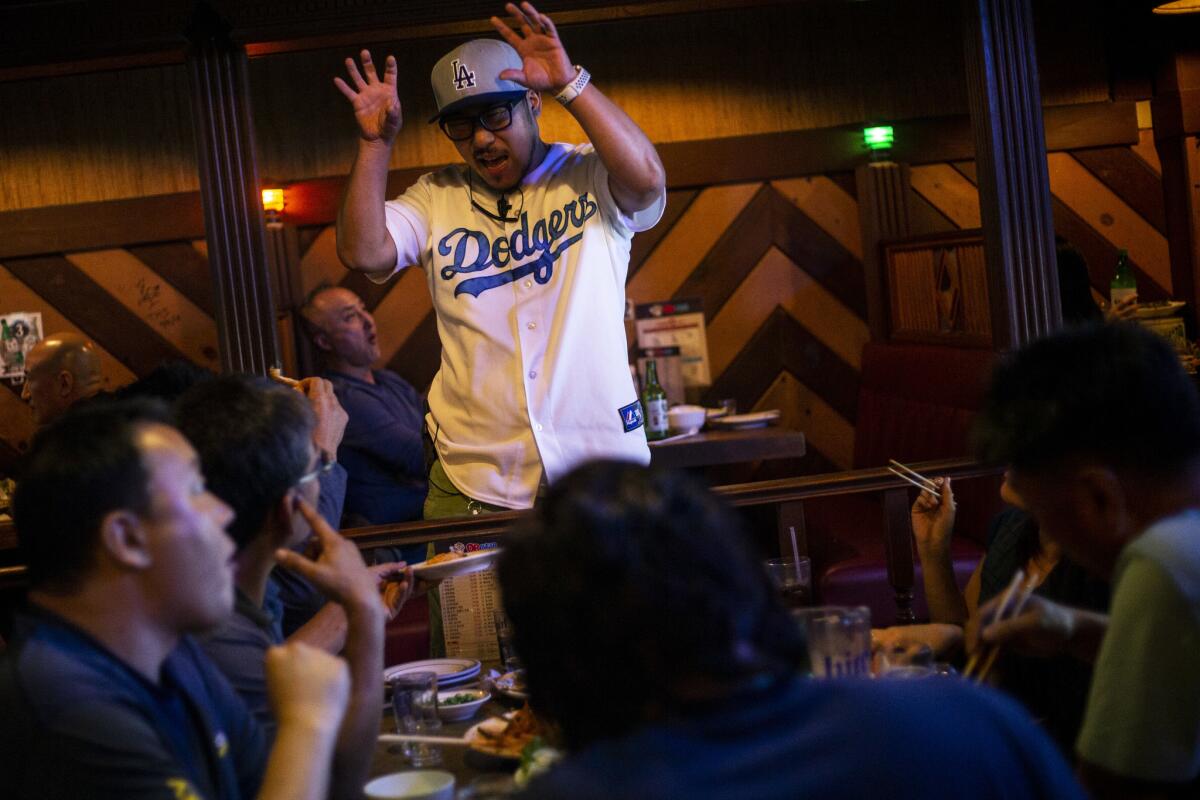
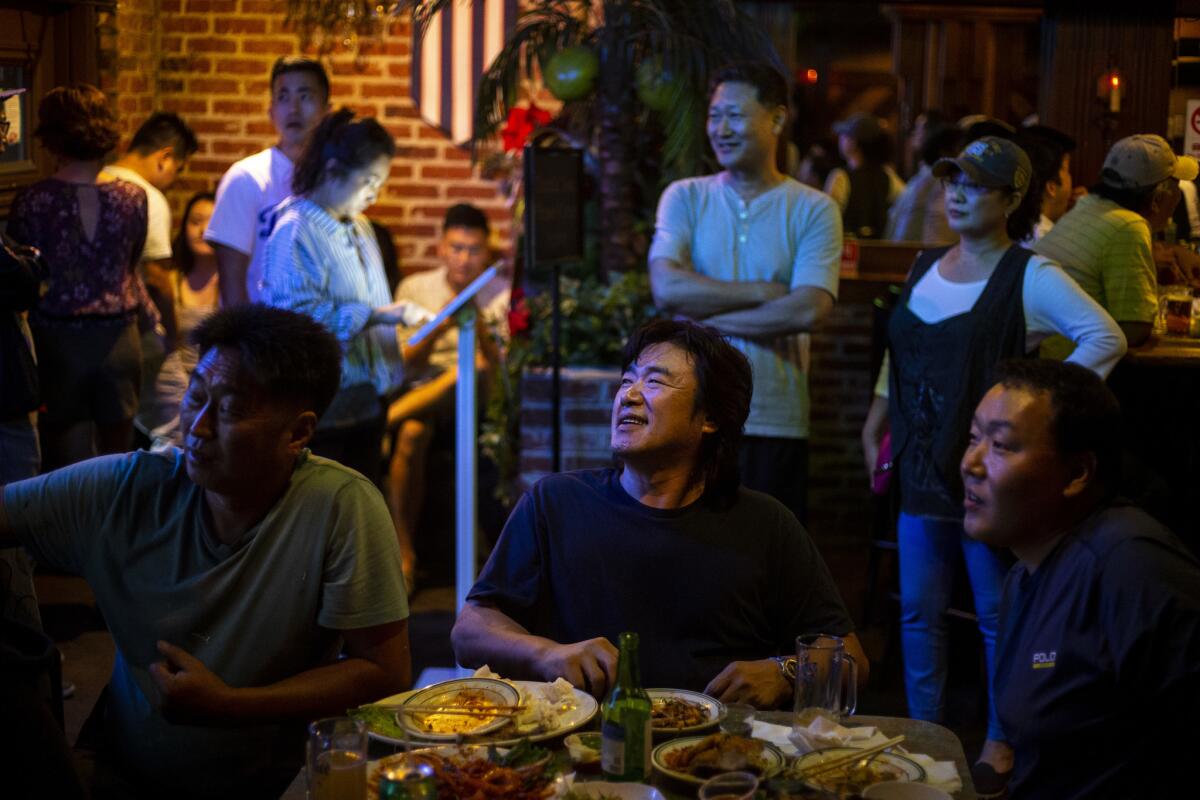
“It’s been a really important part of the Korean side of my life,” Lee said.
Earlier this year, after the restaurant was featured on an episode of Netflix’s “Ugly Delicious,” it began drawing a wave of non-Koreans.
Suddenly people wanted vegetarian and organic options and had questions about the sourcing of the silkworm larvae. They asked if there were more than two flavors of chicken wings. One customer requested “Korean-style” wings, as if the bar served any other kind.
“We’re not Buffalo Wild Wings,” Park said. “We just have original and spicy.”
For newer customers — and for me — OB Bear is just a cool place with tasty food.
For Park, Lee and their community, it’s a tether to a time and place that they may never recapture. It’s home, as close as they can get to it.
In their world, all I’ll ever be is a guest — and I’m starting to realize what a privilege that is.
In 2017, during Game 2 of the World Series, when Charlie Culberson notched a solo home run in the 11th inning to bring the Dodgers within one, I screamed, leapt out of my chair and pounded my seat. I exchanged deliriously happy high-fives with the old Korean men next to me. To my surprise, they struck up a conversation.
RELATED: Diverse Dodgers’ roster mirrors melting pot that is Los Angeles »
They asked if I was Korean, and I was forced to say no, that my parents are from Taiwan. They looked disappointed — betrayed, really — but then they asked who I thought would win the Series, and we shared our displeasure at Ryu’s absence on the postseason roster. We all agreed that Yasiel Puig needed more playing time and shared a laugh at the right-fielder’s habit of celebrating hits with tongue-wagging.
The Dodgers lost. Before I left, one of the men told me, “See you next time.” I shook his hand and told him the same.
Produced by Brian Park
Sign up for Essential California
The most important California stories and recommendations in your inbox every morning.
You may occasionally receive promotional content from the Los Angeles Times.








